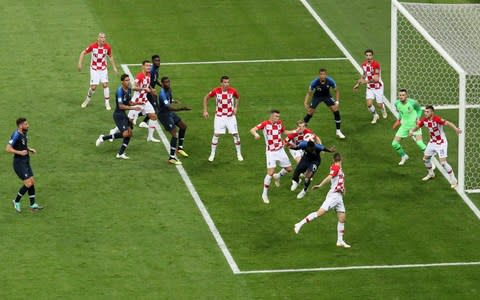Why the handball law needs an overhaul

The introduction of Video Assistant Referees (VARs) at the 2018 World Cup certainly divided opinion at first, but we can probably just about conclude that it has passed its trial and is here to stay.
However, one of the game's most fundamental laws remains extremely problematic: handballs.
The issue with the law was highlighted once again, with pretty major consequences, in Sunday's World Cup final.
Antoine Griezmann whipped a corner into the Croatia box, Blaise Matuidi tried and failed to flick it on, and the ball struck Ivan Perisic on the arm.
READ MORE: Mark Halsey: Why the referee was wrong to award France a World Cup final penalty
READ MORE: Matthaus: 'France won't dominate world football'
READ MORE: 10 World Cup star signings... who turned out to be total failures
Having expected and perhaps preempted that Matuidi would have got a touch on the ball - given it was well within his reach - Perisic jumped behind the Frenchman, only for the cross to strike him on the lower arm.
France's players appealed desperately for a penalty, so the referee, on instruction, consulted video replays, and went on to award a penalty.

The decision was, in fairness, consistent with other handballs at the World Cup. Portugal's Cedric Soares against Iran and Denmark's Yussuf Poulsen against Australia were among the other players to suffer at the fate of referees who were punishing ball-to-hand incidents.
But the consistency does not explain the decision-making. The rules do not state that the ball hitting an arm in the box constitutes an offence. In fact, the rules' wording suggests that the penalties were harshly awarded.
This is the entirety of the 'handling the ball' rule on the FA's website:
Handling the ball involves a deliberate act of a player making contact with the ball with the hand or arm. The following must be considered:
The goalkeeper has the same restrictions on handling the ball as any other player outside the penalty area. Inside their penalty area, the goalkeeper cannot be guilty of a handling offence incurring a direct free kick or any related sanction but can be guilty of handling offences that incur an indirect free kick.
It is difficult to see how any of the three offences mentioned above contravened the rules.

The World Cup referees were instead consistently enforcing a rule that does not currently exist. We therefore suggest an alteration to the rules of the game as they stand, or at least to their interpretation. Here are a few possible solutions:
First of all, make the laws clearer
Commentators constantly talk about a player's arm being in an "unnatural position" or suggest someone "knew nothing about it" when the ball strikes him.
The rules state "the position of the hand does not necessarily mean that there is an offence"; there is no mention of unnatural position.
The distance between the player and the ball should be considered, but if there was ever an "unexpected ball" (per the wording in the rules) then Perisic's was that. The same could be said of Cedric's, described at the time as the 'worst VAR decision of the World Cup'.

Surely the rules need to be more clear about what that means and just how unexpected it needs to be to not constitute an offence.
Whenever there is a handball appeal at the moment, the chaos that ensues just highlights the fact that nobody is completely clear on the rules, not least the referees.
Only deliberate handballs could be punished
The rules currently state "handling the ball involves a deliberate act of a player making contact with the ball with the hand or arm". In reality the number of deliberate handballs is extremely small, anywhere on the pitch.
If the referees were instructed to stick by this wording, there would be a clear rule which would come down to the interpretation of the referee. VAR could be used to get a better idea of whether the act was purposeful.

None of the penalties given for handballs at the World Cup would have been awarded.
A downside would be that teams may feel hard done by if a certain goal were denied by an accidental handball on the line. This alteration would, however, reduce the number of debatable decisions.
Or punish all handballs
I'm not sure this would work, but it would at the very least remove all arguments about whether a handball decision was 'harsh'.
If every time the ball struck a hand or arm it was punished, there could be no argument once the ball had been proven to have touched the player. If it isn't clear from video replays, don't award the penalty.
The problem here is that attackers could 'play for' a handball by trying to kick the ball against an arm, which would certainly take away from the game, but the clarity this rule would provide might just make it worthwhile.
Whatever happens...
...something needs to change. We can't go on with the confusion that the handball rule, such a central aspect of the game, currently brings with it.
